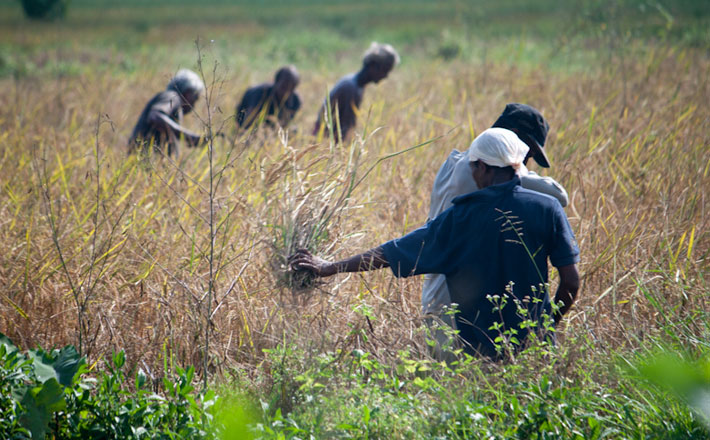Commentary on Exodus 16:2-15
The narrative of Exodus 16:2-15 is powerful and rich with homiletical possibilities.
Divine testing, the function of God’s instruction (torah) in our lives, and the importance of complaint are just a few of the themes in this chapter on which a preacher might choose to focus. Each of these themes, however, is embedded in a story that almost tenderly describes the growing relationship between the children of Israel and their God.
The need for bread in this early stage of the journey out of Egypt provides both God and God’s people with an opportunity to understand and to trust the other. Throughout the narrative, the people struggle to trust and to follow God, and God struggles to know and to nurture this fledgling community of former slaves.
In the opening verses, the narrator establishes that it is the second month of the children of Israel’s journey out of Egypt, and the people are complaining (lit. “murmuring”) against Moses and Aaron because they are hungry. The complaint in this narrative is the third of its kind (see also Exodus 14:11; 15:24). Each complaint follows a certain pattern: (1) the people encounter a potentially devastating threat to their well-being — the pursuit of the pharaoh and his chariots, deadly dehydration, starvation; (2) they complain (literally “murmur”) against their leadership; (3) their human leaders bring the complaint before God; and (4) God saves them by various means — the miraculous crossing of the sea, providing drinkable water, and, in this narrative, providing bread from heaven.
The language of the complaint is strong. One might even say it is unfair. “The Israelites said to them, ‘If only we had died by the hand of the LORD in the land of Egypt, when we sat by the fleshpots and ate our fill of bread; for you have brought us out into this wilderness to kill this whole assembly with hunger’” (16:3). The harsh servitude the people endured in Egypt, described in the earlier chapters of Exodus, bears no resemblance to this description of the plenty they claim they enjoyed there.
Interestingly, the people make no mention of pharaoh and his unreasonable demands. In an indirect way, the people seem to blame God both for their current crisis in the wilderness as well as their enslavement: “If only we had died by the hand of the Lord in the land of Egypt” (emphasis mine). Pharaoh was the one trying to kill them in Egypt. God rescued them! Their hunger leads them to what seems to be willful forgetfulness.
One might be tempted to regard the pattern of complaints in these chapters and the injustice in the wording of this particular complaint in a negative light, but, while Moses and Aaron appear to be frustrated with the people, the text portrays God as focused on the people and their needs rather than disturbed by their demands. Indeed, the complaint and the occasion that prompts it provides God with an opening to learn more about them by means of a test.
The test itself is multilayered. On the surface, the test enables God to know the people’s response to the gift of manna: will they follow God’s instruction and gather only what they need according to the day? Will they respect the Sabbath? The answers to these questions seem to be the overall purpose of the test according to 16:4, but the test also serves another, perhaps more important, purpose: the gathering of manna in the wilderness — with specific amounts brought in on certain days — creates a structure in the people’s lives that is a reliable constant in the turmoil of their wilderness wandering.
The people gather in the morning what they need for the day and no more, except on the day before the Sabbath when they gather enough for both days. There are no days on which the manna fails to appear. Although the reader is not yet aware that this journey to their new land will take forty years, the narrator notes that this provision of manna lasts the entirety of the trip (16:35). Order is thus established in the midst of chaos by means of this rhythm of divine provision.
The narrative of God’s provision of manna in the wilderness extends throughout this entire chapter of Exodus, and yet the reading for this Sunday concludes at v. 15. Sometimes I find this disrupts the story, but this is one case in which the excerpt serves to highlight a key aspect of the narrative by means of an inclusio: the story begins with the people complaining about the lack of food and longing for the false memory of the bread and stew of Egypt; v. 15 concludes with the declaration of Moses in response to the people’s wonder at this new and unexpected food-source. He says, “It is the bread that the Lord has given you to eat.”
In verses 2-3, the people claimed to long for Egypt and its bounty, but what Egypt really represented was a complete lack of rest with a pharaoh who cared nothing for their well-being or their needs. Here, bread and rest — on the Sabbath — are provided generously and reliably. The difference between the former reality of their lives in Egypt and their present reality in the hands of a trustworthy God, who provides for them even in the wilderness, is made clear when one compares the beginning of the narrative to the end of the reading at verse 15. As Terence Fretheim notes, the “idealized and unwarranted memories of Pharaoh’s food (verse 3) are to be replaced with the genuine memories of the bread from God.”1
The stress and chaos of life on the journey of the children of Israel through the wilderness is intense and debilitating, so much so that the people begin to long for their former lives as slaves in Egypt. As they long to go back, God’s grace pushes them forward by providing strength for the journey in the form of food and a structure to their days and weeks by the instructions regarding the keeping of the Sabbath.
In preaching this text, I couldn’t help but think of so many people in our congregations who experience upheaval and uncertainty. This story gives the wonderful promise of God’s provision, which is reassuring to all of us. It also might serve as a guide for when we’re in stressful times to let the rhythms of religious observance — daily prayer and weekly worship, for example — bring order to the chaos.
Notes:
1 Terence Fretheim, Exodus, Interpretation, (Louisville, KY: John Knox Press, 1991), 187.


September 21, 2014